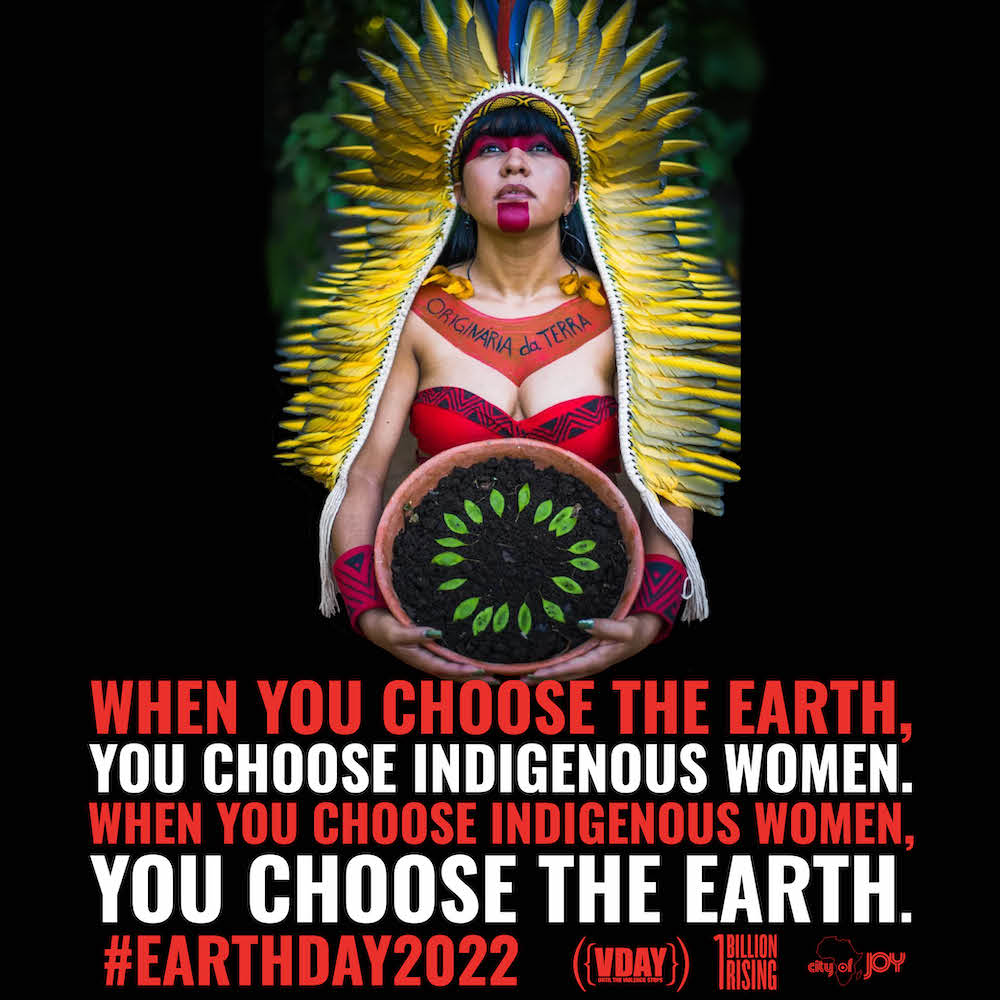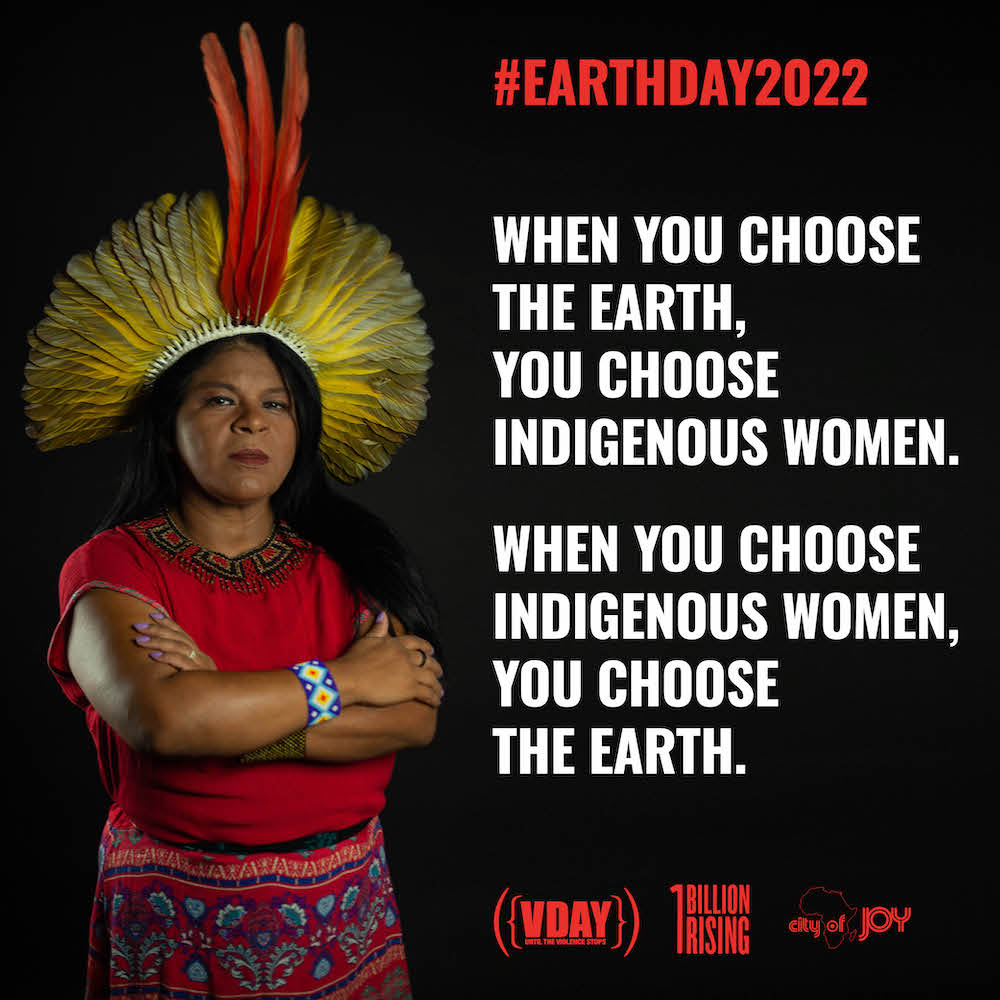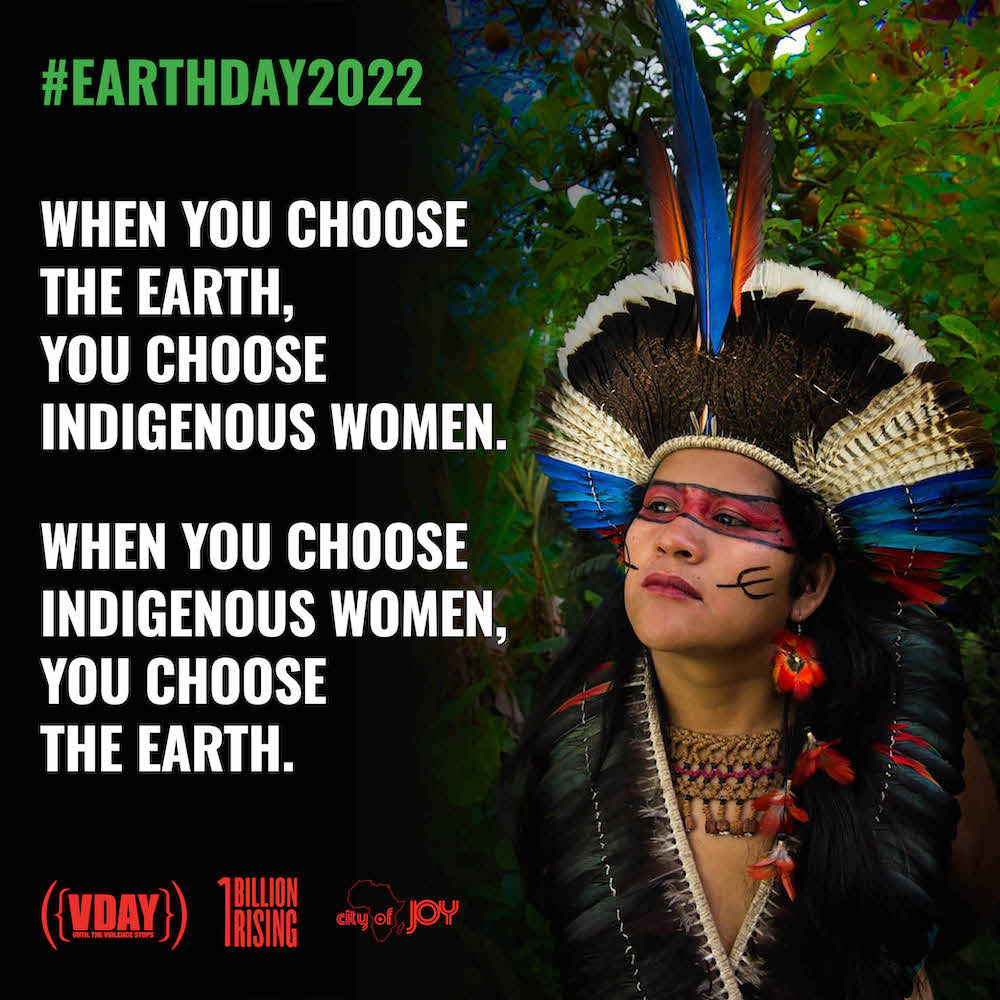On Earth Day and every day, we RISE for the Bodies of All Women, Girls & the Earth. This year we spotlight indigenous women of ANMIGA – The National Articulation of Indigenous Women Ancestrality Warriors – who come from all biomes across Brazil. These women have deep knowledge about their lands and have preserved their ancestral traditions. They are united in their struggle to guarantee the rights and lives of the indigenous people of the Amazon. Their call to action must urgently be heard:
“When you choose the Earth, you choose Indigenous women. When you choose Indigenous women, you choose the Earth.”
“ANMIGA is composed of indigenous women, originally from the Earth. We know that the root of Brazil comes from us, from the womb of the Earth and from our ancestors. The Mother of Brazil is Indigenous. Brazil never existed and will never exist without us. We understand the importance of political articulation of water-women in constant movement in the stream of struggles. We are the seeds of our ancestors, those who even before the social movement existed already had the traditional and ancestral movement that strengthens us and is present in our territorial body, reflected in our biomes, in our waters and in the seeds that paint, adorn and feed our bodies.
We are because our ancestors were. Indigenous women have always been present in movements: whether in more local movements or at the national level. Women in the communities: midwives, medicine women, shamans, leaders and cacicas. Since the 1980s until today.
Before contact with non-Indigenous peoples, we Indigenous Peoples had our unique way of living and surviving for millennia, which underwent transformations after the arrival of others within our territories. Since then, we have relied on the partnership of non-Indigenous people to preserve and access our rights, sometimes fleeing, sometimes silencing us, sometimes violating our own ways of life, but always resisting. We, indigenous women, gathered and united in the ancestral diversity of our Peoples, are the seed of resistance, wisdom and mastery of the millennial traditional knowledge inherited from our elders, and in respect for them and for those who will come, we will always defend our diverse traditions and cultures practiced in our territories. We have our own indigenous science strengthened in our spiritualities, which unites us in the same purpose: to live in harmony and to practice living well and a good living in our own way.” – ANMIGA
Take Action this Earth Day & RISE for the Indigenous Women of the Amazon:
OCCUPY social media, SHARE the campaign widely across all social platforms
SHARE the stories of Celia Xakriabá, Sônia Guajajara, Eunice Kerexu and tag them
SUPPORT ANMIGA and the women of the Amazon who are Keeping the Earth Alive
Celia Xakriabá – @celia.xakriaba
Sônia Guajajara – @guajajarasonia
Eunice Kerexu – @anmigaorg
CÉLIA XAKRIABÁ

My name is Célia Xakriabá, of the Xakriabá people, I define myself as an activist, a member of the National League of Indigenous Women, from the Cerrado scrublands, though we defend all Brazilian biomes equally. I work on multiple fronts, as a representative of indigenous peoples and women, as a lecturer and parliamentary aide to Áurea Carolina. I have a master’s degree in Sustainable Development, obtained from the University of Brasília’s Professional Master’s Degree Program in Sustainability among Traditional Peoples and Territories. I’m currently studying for a doctorate in Anthropology from the Federal University of Minas Gerais. My first school was struggle on numerous fronts: to guarantee our homelands, because the fight for land is the fight for life itself; to restructure the educational systems; to support women and the youth. I have carried our struggle on the ground at the indigenous villages, and on the ground of the world.
I am the first indigenous woman to have a podcast on Globoplay, dealing with indigenous matters. We, the indigenous peoples, want to stake out and occupy various territories, on land and on screens using digital and ancestral technologies, because it’s not about what things do to us, but what we do with things. We want re-signification, to avoid acculturation and foster indigenization.
Visit: www.celiaxakriaba.com
#povoxakriaba #povosindigenas #genipapo #urucum #territory
“At the age of six, I started at indigenous school. Nobody ever taught me that ‘Brazil was discovered by Pedro Alvares Cabral’. At our indigenous school I learned to write not only with the ink from our pens, but first and foremost with the dye and power of urucum (from the lipstick tree) and jenipapo. Later, I walked the halls of university, but always aware that struggle was my first school and my first university. I have been in this fight since I was thirteen years old, standing with our leaders, and it’s important to say, and never forget, that the first book I read was my grandfather. And I believe in the importance of struggle as the fourth power. The Xakriabá walk with me, because I believe we carry our people inside us. We are a people that resists through the power of blossom. I am an indigenous woman who fights on many fronts. I am Célia Xakriabá.”
SÔNIA GUAJAJARA

Sônia Guajajara is from the Guajajara/Tentehar people, originally from the Araribóia´s indigenous land, in the state of Maranhão, Brazil. She was born in 1974 to illiterate parents. She is the mother of three children. She left her state for the first time at age 15, when she was invited to attend high school in the state of Minas Gerais, southeast. Afterwards, she returned to Maranhão, where she graduated in Literature and Nursing, and a post graduation degree in Special Education.
Her indigenous and environmental activism started when she was young, in grassroots movements. She soon gained national recognition, becoming vice president of COIAB (Coordination of the Indigenous Organizations of the Brazilian Amazon), and then executive coordinator of APIB (Articulation of Indigenous Peoples of Brazil) for the Amazon.
Since then, Sônia Guajajara has been one of the main leaders on the front line against a series of projects that attack rights and threaten the lives of indigenous peoples and the environment. She gained international recognition due to dozens of complaints about violations of indigenous rights made in different instances of the UN, the European Parliament and the World Climate Conferences (COP), from 2009 to 2021. Sonia traveled to more than 30 countries around the world exposing the violence against indigenous peoples and Brazilian forests.
In 2018, she was the first indigenous person to run in a president ballot in Brazil and continues to articulate the participation and protagonism of indigenous women on various fronts of struggle.
In 2019, she co-organized the First March of Indigenous Women in Brasília, bringing together more than 2,000 women from the most diverse peoples (more diverse ethnicities). The march culminated in the foundation of ANMIGA – The National Articulation of Indigenous Women Ancestrality Warriors, a national reference organization that mobilizes indigenous women from all Brazil’s biomes.
Also in 2019, she led a campaign Indigenous Blood – Not a Single Drop More, which, together with 9 other APIB indigenous leaders, travelled around 12 European countries, taking complaints about violations perpetrated by the Bolsonaro government, as well as demanding measures that put pressure on the Brazilian government and agribusiness companies to comply with environmental preservation agreements and respect for the rights of indigenous peoples, which Brazil is a signatory.
Due to the pandemic and following the international health guidelines of social isolation, she coordinated through the Articulation of the Indigenous Peoples of Brazil (Apib) and the organizations that are part of the National Indigenous Mobilization (MNI) to carry out the ATL (Acampamento Terra Livre) in a virtual mode and in networks. She also led online assemblies and the preparation of the Indigenous Emergency Plan carried out by APIB.
Sônia Guajajara has already received several awards and honour, such as the 2015 Order of Cultural Merit Award from the Ministry of Culture, given by then President Dilma Rousseff. She was also awarded the Medal 18 de Janeiro by the Padre Josimo Center for the Promotion of Citizenship and Defense of Human Rights, in 2015, and the Medal of Honour to Merit from the Government of the State of Maranhão, for the great articulation with government bodies during the period of fires in the Araribóia Indigenous Land.
In 2019, she received the João Canuto Award for the Human Rights of the Amazon and Freedom, by the Human Rights Movement Organization and also the Packard Award granted by the World Commission on protected areas of the International Union for Conservation of Nature (IUCN).
Today she is part of the Executive Coordination of the Articulation of Indigenous Peoples of Brazil (APIB), ending her second term (2013/2017) (2017/2022). She is also a member of the Board of the Interfaith Initiative for the Tropical Forests of Brazil, an initiative that is part of a United Nations Program.
EUNICE KEREXU

Kerexy Yxapyry is Mbya Guarani leader, Coordinator of the Guarani Yvyrupa Commission, an organization that works in the territorial defense of the Guarani People who lives in the Atlantic Forest – south and southeast of Brazil. She is the executive coordinator of The Articulation of Indigenous Peoples of Brazil(APIB), which is the largest national indigenous movement.
Co-founder of ANMIGA – The National Articulation of Indigenous Women Ancestrality Warriors. In her trajectory of struggle, she acted strongly for the ratification of the Morro dos Cavalos Indigenous Land and, also, in the field of education and environment. She is an environmental manager graduated from the Intercultural Indigenous Licentiate of the South, Atlantic Forest (Federal University of Santa Catarina), Master’s student in territorial planning and management at UDESC, Santa Catarina State University. Founder of the Tataendy Rupa Training Center.